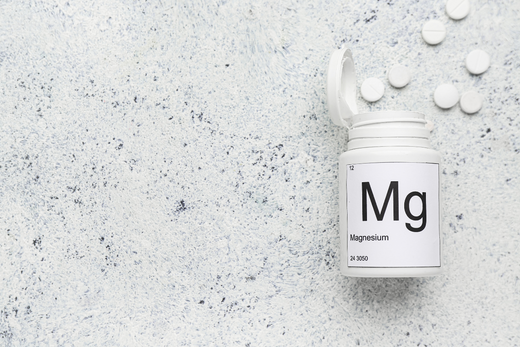
What Are The Different Types of Magnesium?
Written by Our Editorial Team & Medically Reviewed by Dr. Aisling Lanigan, N.D.
The LunHer Take
When it comes to magnesium supplements, there is no shortage of available options. Bioavailability is key. You want to get the maximum absorption with the least side effects.
Read on to learn about the different types, possible health benefits and their various functions to determine the best choice for you.
What is magnesium?
Magnesium is an essential mineral that plays a major role in the body’s functioning. It assists 300-plus enzymes in carrying out chemical reactions that help to keep bones and teeth strong and the heartbeat steady. It is also required for the production of energy, building of proteins, and to keep muscles contracting and the nervous system functioning optimally.
What is magnesium's role in the body?
Every organ in the body needs magnesium, especially the muscles, heart, and kidneys. Since the body doesn’t make magnesium on its own, it needs to get it from food sources like dark leafy greens, nuts, seeds, avocados, bananas, whole grains, tofu, fatty fish, and dark chocolate. Most people do not get enough magnesium in their diet and, as a result, many people may have a magnesium deficiency and have no idea. The good news is that supplementation can help to bridge the gap and prevent any potential serious consequences of a magnesium deficiency.
Health benefits from taking a magnesium supplement
Given magnesium’s role in keeping a body running well, and considering that many people are low or deficient in magnesium], most people would benefit from taking a supplement to ensure that they’re getting enough magnesium on a daily basis. It is crucial for your nervous system, bones, muscles, brain, heart, and the creation of energy. It is purported to boost exercise performance, and is especially good for muscle recovery. Epsom salts bath, magnesium flakes, and topical magnesium sprays are also helpful to many athletes of all levels.
The recommended dietary allowance (RDA) of magnesium is 320-420 mg. The right amount for you depends upon a number of factors, including gender, age, and general health.
Forms of magnesium and their benefits
The difference between the various types of magnesium is that each one is attached to an amino acid or a compound that will impact their absorption and how they are primarily used by the body. There have been some small studies that have found that magnesium in the aspartate, citrate, lactate, and chloride forms are all absorbed more completely and, therefore, more bioavailable than magnesium oxide and magnesium sulfate.
There aren't many side by side comparisons using human volunteers along with the different types of magnesium. However, animal studies demonstrate various levels of magnesium bioavailability. This study of magnesium bioavailability in magnesium depleted rats showed that although the absorption of magnesium may vary depending upon form, they all positively impact the plasma and red blood cell levels of magnesium.
Magnesium Glycinate
Magnesium glycinate combines the mineral with the amino acid glycine. Glycine is an amino acid that is used by the liver to make glutathione, an endogenous (meaning, it’s a compound made entirely in your body) antioxidant. It’s also used to make other proteins in the body.
Magnesium glycinate is considered a bioavailable form of this mineral. It is a chelated form, which means it is better utilized by the body than most other forms of magnesium. It is one of the most effective types of magnesium supplements because of high bioavailability. It is generally well-tolerated, fast-acting and less likely to cause gastric distress, loose stools, gas, bloating, or diarrhea. This study of the bioavailability of magnesium glycinate as compared to magnesium oxide demonstrates that magnesium glycinate is beneficial for absorption in those with digestive issues.
It is reported to promote healthy sleep – animal studies (no 1, no 2) suggest that glycine on its own can help improve sleep and treat some inflammatory conditions, including heart disease and diabetes.
Magnesium glycinate may also support vitamin D supplementation when combined with vitamin D, compared to supplementing vitamin D alone or taking a placebo.
Magnesium Taurate
Magnesium taurate is magnesium combined with taurine, an amino acid that stabilizes magnesium but is also used by the body for cell development. Taurine supports mitochondrial, metabolic, and energy generating balance in the body.
High levels of taurine are naturally found in the heart, brain, skeletal muscles, large intestine, and eyes. Based on this animal study, magnesium taurate is rapidly absorbed, able to pass through to the brain easily, and has the highest tissue concentration level in the brain. A 2018 animal study revealed that magnesium taurate significantly reduced blood pressure in rats with high levels, indicating that this form may bolster heart health.
Magnesium L-Threonate
Also known as magnesium threonate, magnesium L-threonate is the mineral combined with threonic acid, which is produced from the breakdown of vitamin C. Magnesium threonate is considered bioavailable, particularly for supporting magnesium status in neurons and the central nervous system.
Magnesium L-threonate is often used for its potential brain benefits and may help manage certain brain disorders, such as depression, Alzheimer’s disease, and age-related memory loss. The primary study shows that participants taking a magnesium L-threonate with phosphatidylserine, vitamin D, and vitamin C showed significant enhancements across all five subcategories of the CMT and in overall memory quotient (MQ) scores compared to the placebo group – though it's ambiguous which nutrient contributes to the beneficial effects. This animal study showed improved brain function from memory and learning aspects with bagnesium L-threonate supplementation. This study also showed that magnesium L-threonate enhanced synaptic plasticity in the hippocampus which directly impacts the learning and memory of rats. This animal study further demonstrates it may be the most effective type for increasing magnesium concentrations in brain cells.
Magnesium Malate
Magnesium malate is the mineral combined with malic acid, an organic compound found in fruit and wine. Malic acid is sometimes added to supplements because of its ability to help increase energy levels, boost skin health, and improve athletic performance. Magnesium malate is well-tolerated and taken by people for muscle support.
This animal study observed that magnesium malate and magnesium taurate were the highest bioavailable forms of magnesium when compared to magnesium citrate and magnesium oxide. It further suggests that magnesium malate is very well absorbed and gentle in the digestive tract and considered highly bioavailable. Some studies have shown that there are benefits for treating fibromyalgia and chronic fatigue syndrome symptoms.
Magnesium Citrate
Magnesium citrate is probably the most well-known type of magnesium supplement. Magnesium citrate binds the mineral to citric acid, which is naturally derived from citrus fruits. Often referred to as a “saline laxative”, it is used to support bowel movement due to constipation, and to clear the intestinal tract as part of a colonoscopy preparation. It works by the process of osmosis, pulling water into the intestinal tract where the additional water helps to soften the stool and makes it easier for it to pass. It is important to drink plenty of water when using magnesium citrate in order to avoid dehydration.
It is also used as a supplement on a daily basis to raise magnesium levels in the body. This study demonstrates that daily magnesium citrate supplementation showed superior bioavailability 60 days after treatment when compared to amino acid chelates (magnesium oxide).
This study comparing higher bioavailability of magnesium citrate to magnesium oxide concluded that magnesium citrate may be more suitable than magnesium oxide to optimize dietary magnesium intake. Serum levels were highest after supplementing with the citrate form.
This study compared magnesium oxide and magnesium citrate with respect to in vitro solubility and in vivo gastrointestinal absorbability found that magnesium citrate was more soluble and bioavailable than magnesium oxide.
Magnesium citrate is considered to be more bioavailable than some other forms. It has a natural laxative effect, so may be used by medical providers to address constipation. For those who find the side effects of diarrhea or loose stools to be uncomfortable, other forms of magnesium are better alternatives.
Magnesium Oxide
Magnesium oxide is the mineral paired with oxygen. While it contains more magnesium than most others, its bioavailability and effectiveness are not as high. This study found that magnesium oxide had only 4% fractional absorption and poor bioavailability in comparison to magnesium chloride, lactate, aspartate. This study also found that magnesium oxide and chloride were poorly absorbed.
Magnesium Chloride
Magnesium chloride is a combination of 1 magnesium atom and 2 chloride atoms and is obtained naturally by the solar evaporation of seawater. It is highly absorbable in water, making it more bioavailable in the intestinal tract than less soluble forms of magnesium. It is available both orally and topically. It is purported to promote an increase in lower stomach acids, help with relaxation and better sleep, and to help with a magnesium deficiency. This study also found that magnesium oxide and chloride were both poorly absorbed, while this study found that magnesium chloride has a higher bioavailability than magnesium oxide.
Magnesium Hydroxide
Magnesium hydroxide is a pharmaceutical form of the mineral that is found in over-the-counter laxative products, like Milk of Magnesia. It is considered to be a saline laxative and is sometimes recommended by medical providers to address short-term constipation.
Magnesium hydroxide helps the intestines to retain more water, which can reduce how hard bowel movements are, leading to better frequency and ease of transit in the gut. Consult a medical provider before using a laxative, since constipation can be a sign of more serious health needs.
Magnesium Lactate
Magnesium lactate is magnesium that has been bound with lactic acid. It has been shown to be more bioavailable than magnesium oxide and to have better retention than other inorganic salts such as magnesium sulfate. Magnesium lactate does not need to be converted by stomach acid, and is more gentle for people over 50, and those on certain medications. Some brands of magnesium lactate help manage symptoms of digestive discomfort.
Magnesium lactate has been shown to have similar bioavailability when compared to magnesium aspartate and chloride. Magnesium lactate has not been widely studied for general nutritional support, although a small study found that a slow-release version of this nutrient can support supplementation.
Magnesium Sulfate
Magnesium sulfate is the mineral combined with oxygen and sulfur, and typically found in a crystallized salt form, also known as Epsom salt. Magnesium sulfate is typically used topically, like in oils or lotions, or dissolved into water for baths or soaks. While it can be consumed internally, it tastes bitter and can be dangerous if consumed improperly. Magnesium sulfate is not considered to effectively support magnesium status, since this has not been proven by research to absorb through the skin.
Magnesium Orotate
Magnesium orotate is magnesium bound with orotic acid. It is easily absorbed and one of the more expensive magnesium supplements when sold in supplement form. Orotic acid is needed for DNA production and for the regulation of genetic material. Based on preliminary research, it may be beneficial in supporting cardiovascular and neuronal health, though more research is needed.
Magnesium supplementation
Recommended magnesium dosage
The recommended dietary allowance (RDA) of magnesium is 320-420 mg. The right amount for you depends upon a number of factors, including gender, age, and general health.
Can you take too much magnesium?
While magnesium is generally considered to be a safe supplement, it is possible to take too much. You should follow the instructions on the label or the recommendation of your physician.
Potential side effects and risks
Loose stools, diarrhea, and other forms of digestive distress may occur depending on the dose, frequency of use, and type of magnesium being used. Taking 5000 mg or more can lead to toxicity in children according to this case. Always talk to your doctor before starting a new supplement. Extra caution should always be used with children, pregnancy, and those who are lactating.
How to Choose the Right Magnesium Supplement
To choose the right magnesium supplement for you, it’s important to know why you need it and the factors that are important to assess overall quality.
Understand your health needs
Magnesium as a nutrient supports many aspects of health, from muscles to bones to bowel regularity. While it’s possible to get all of the magnesium that you need from food alone, there are many reasons why a dietary supplement may be recommended.
You may need a magnesium supplement for any of the following reasons:
-
To support general nutritional intake
-
For healthy gut motility and constipation support
-
As a support for healthy bones
Your medical provider may suggest a specific form of magnesium, but typically, the reason why you are taking the mineral will inform the type of supplement you choose.
Possible side effects
When magnesium is taken as directed, it is generally safe. Since it is often used to support bowel motility, it may also produce side effects like diarrhea, intestinal cramping, and nausea.
If taken at higher-than-recommended amounts, it can cause loose stools, diarrhea, or other complications.
Magnesium can interact with some medications, so be sure to tell your medical provider about any medications, OTC medicines, or other supplements that you take.
Absorption efficiency
Magnesium forms can have different bioavailability, although most of the commonly available forms have a similar rate of absorption.
Other things to consider about magnesium absorption:
-
While magnesium does not affect calcium absorption, taking magnesium supplements with calcium supplements may reduce how much magnesium is absorbed.
-
Vitamin D, especially at higher supplemental intakes, may increase magnesium absorption.
-
Higher supplement intakes of zinc might decrease absorption of magnesium or may increase how much magnesium is excreted. This effect is more of a concern for postmenopausal people who have more significant bone density concerns.
Quality of supplement
It’s important to evaluate the quality of magnesium supplements.
-
Supplement facts: This tells you how much of the nutrient is found in each serving size.
-
Other ingredients: Most supplements have some additional ingredients, which may include the capsule, antioxidants, preservatives, sweeteners, flavorings, and more. Consider whether any of these are problematic for your health needs.
-
Third-party testing: Brands may choose to have third-party or independent quality, sustainability, or purity tests. This can help to set apart a brand’s quality as well as provide customer assurance of transparency.
-
Allergens: If you have food allergies or sensitivities, be sure to verify that any supplement is free from them. These are usually clearly disclosed on the label, but if you have less common allergens or need additional information, use the brand’s contact information on the label to get more information.
-
Values: Whether you are vegan, vegetarian, or want a non-GMO product, brand values and manufacturing standards can impact whether or not a supplement is right for you. You can get this info by reading labels closely and by learning more about the supplement manufacturer on their website.
What are the Health Benefits of Magnesium?
Magnesium supports more than 300 enzymatic reactions in the body, making it an essential nutrient for various tissues, organs, and systems. Below are some of the most common reasons that magnesium supplements are used.
Muscle support
Magnesium has widely been considered supportive of healthy muscles, but whether it actually improves muscle comfort has not always been clearly shown. A small study of adults with exercise-caused muscle soreness found that 350 mg of magnesium each day helped with muscle soreness when compared to placebo. There’s little other research that explicitly shows benefit for muscle comfort, although balanced magnesium intake is essential for numerous reasons.
Sleep support
While magnesium is sometimes found in sleep support formulas, the research on how it affects sleep is mixed. A study that used 226 mg of magnesium at bedtime found that leg cramps and sleep quality were improved after 60 days versus placebo. Other studies have not definitively proven magnesium’s impact on restless legs or other sleep-related issues. Larger studies are needed.
Heart support
Research from population studies has found that higher magnesium levels or a reduced incidence of magnesium depletion were linked to better heart health parameters, although more direct clinical trial interventions are needed. Magnesium supplementation has been shown to support healthy metabolic measurements, but larger randomized controlled trials are needed to confirm the impact.
Bone health support
Magnesium from dietary and supplement sources support bone mineral health. Population studies have also found that higher consumption of magnesium is also tied to bone strength, Large clinical trials are needed to confirm this.
Energy support
There are many small studies that have found magnesium to be supportive of energy metabolism, typically with how carbohydrates are converted and stored or used for energy. However, just as many studies show that the mineral has no effect. Most of these studies are older, and they used different forms of magnesium at different dosages for varying lengths of time, which makes it hard to translate the benefits.
Population studies link higher intake of magnesium with improved energy metabolism and food for energy use. When people consume less than 250 mg of magnesium per day, there’s a 56% reduction in health potential.
Digestive health support
Magnesium has long been used to support bowel regularity. A healthy intake of magnesium that is optimally balanced with calcium has been linked to more medium-chain fatty acids (MCFAs), which can be consumed from foods or synthesized by the microbiome. In this case, the optimized magnesium intake led to enhanced gut microbial activity to produce MCFA. These healthy fatty acids can be used by the body to energize intestinal epithelial cells, maintain a healthy gut mucosal lining, and support healthy immune system responses.
Frequently Asked Questions
What is the most effective form of magnesium?
The most effective form of magnesium depends on the reason you are taking it. For general magnesium nutrition support, magnesium glycinate is well tolerated and tends to cause fewer gastrointestinal effects than other types. Magnesium lactate is absorbed easily in the gut.
Can you get magnesium from food?
Magnesium is found in many foods. Some of the most abundant sources of magnesium foods include legumes (edamame, black beans, peanuts), nuts (almonds, cashews), dark chocolate, whole grains (oatmeal, whole wheat), and fresh vegetables and fruits (avocado, spinach, kale).
Can you take magnesium supplements every day?
Yes, magnesium supplements can be taken every day. Work with your healthcare provider to determine the best way to support your magnesium needs. Do not exceed more than the recommended intake, since excessive magnesium can cause side effects. If you get plenty of magnesium from foods, you may not need a supplement every day. But if you have gastrointestinal conditions or other factors, your healthcare provider may recommend a daily magnesium supplement.
When is the best time to take magnesium?
Magnesium should be taken with food to support better absorption. It can be taken at any time of the day, but should ideally not be paired with iron or zinc, to support bioavailability.
The Bottom Line
Magnesium is a vital mineral that supports energy metabolism, bone health, and much more. While it’s possible to get enough from the foods that you eat, if you have certain conditions or low dietary intake, a magnesium supplement can help to bridge the gap and support nutritional balance.
Your healthcare provider can determine the best form of magnesium supplementation for you. Follow their recommendations for dosage, and remember, that many types of magnesium may have laxative uses or side effects—so it’s important to follow dosage guidelines closely. When you’re choosing a magnesium supplement, it’s important to consider quality, the form of magnesium, and the elemental value of magnesium in each serving.





